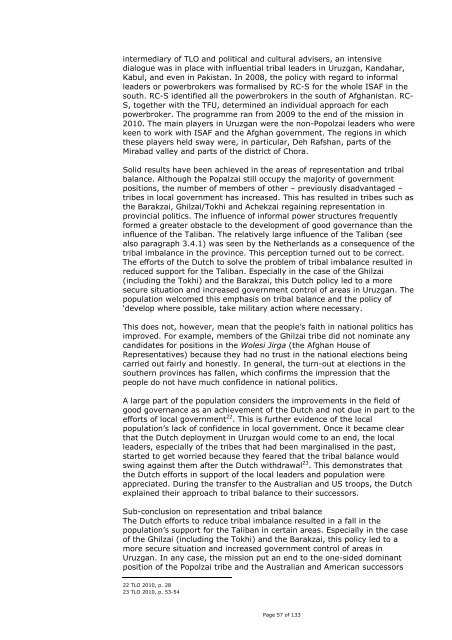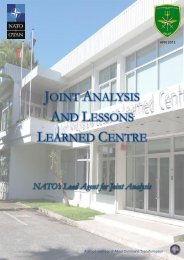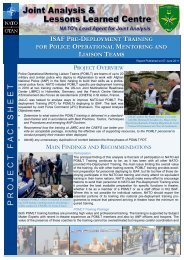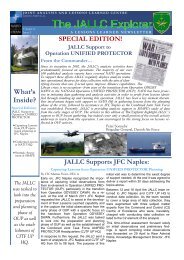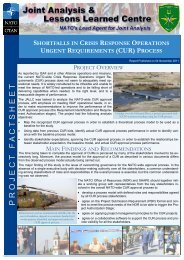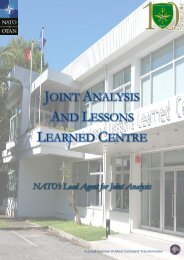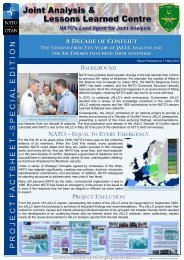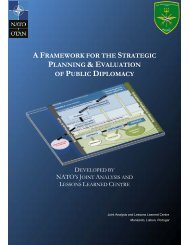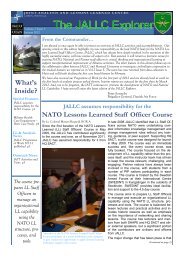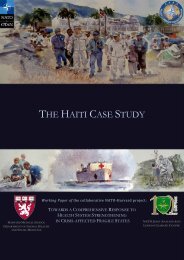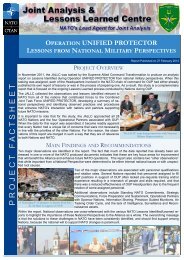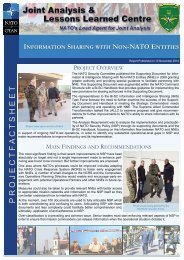<strong>in</strong> the area of security. There was therefore no unity of effort regard<strong>in</strong>g thisissue. As a consequence, the <strong>Netherlands</strong> was not able to f<strong>in</strong>d a consistentand def<strong>in</strong>itive solution for the complex problem of deal<strong>in</strong>g with this type of<strong>in</strong>formal leader.Sub-conclusions on power brokersDutch policy towards certa<strong>in</strong> power brokers resulted <strong>in</strong> ga<strong>in</strong><strong>in</strong>g theconfidence of previously marg<strong>in</strong>alised tribes. However, the adopted policydid not lead to curb<strong>in</strong>g the power and <strong>in</strong>fluence of these power brokers;even without a formal power base and without contact with the Dutchmilitary <strong>in</strong> the area, they cont<strong>in</strong>ued to play a significant role dur<strong>in</strong>g thecourse of the Dutch mission. The lack of <strong>in</strong>ternational agreements on howto deal with <strong>in</strong>formal leaders resulted <strong>in</strong> the Dutch policy <strong>in</strong> this area hav<strong>in</strong>glittle effect.4.4.4 Representation and tribal balanceUruzgan has a complex tribal power structure. Tribal leaders have longplayed an important role <strong>in</strong> society <strong>in</strong> the prov<strong>in</strong>ce and there is little scopefor other forms of governance, although the situation is graduallyimprov<strong>in</strong>g. As mentioned above, the Popolzai tribe, with its former leadersJan Mohammed Khan and Matiullah Khan, is very dom<strong>in</strong>ant <strong>in</strong> the prov<strong>in</strong>ce,even though this tribe is a m<strong>in</strong>ority of the population. Right from the start,the Dutch devoted considerable attention to the distorted tribalrelationships. The great majority of the tribes <strong>in</strong> Uruzgan had no share <strong>in</strong>the power and consequently had no access to the – limited – publicservices. Achiev<strong>in</strong>g a better reflection of the tribal relationships <strong>in</strong>government posts was a first priority. Dutch policy was aimed at – wherepossible – mak<strong>in</strong>g a contribution to a structural improvement <strong>in</strong> theserelationships, both <strong>in</strong> formal and <strong>in</strong>formal governance.Up until May 2007, the Afghan government allotted only very little centralfund<strong>in</strong>g to improv<strong>in</strong>g governance <strong>in</strong> Uruzgan. In response to these problemsand at the request of local adm<strong>in</strong>istrators, the <strong>Netherlands</strong>, via its embassy,used its <strong>in</strong>fluence to br<strong>in</strong>g about the re<strong>in</strong>statement of the operational fundsfor the prov<strong>in</strong>cial governors, which had been stopped <strong>in</strong> <strong>2006</strong>. These fundspay for, among other th<strong>in</strong>gs, tribal representation activities andreconciliation programmes. The <strong>Netherlands</strong> has contributed f<strong>in</strong>ancially tothese funds via the ARTF.In order to counterbalance the <strong>in</strong>formal power structures of Popolzaipowerbrokers and the distorted tribal relations, the <strong>Netherlands</strong> gaveconsiderable support to tribal leaders of less <strong>in</strong>fluential tribes. These tribesare the Ghilzai, particularly <strong>in</strong> the Mirabad region, the Deh Rafshan areaand Deh Rawod, and the Barakzai and Achekzai tribes <strong>in</strong> the district ofChora. The cultural advisers played an important role <strong>in</strong> ma<strong>in</strong>ta<strong>in</strong><strong>in</strong>gcontacts with the leaders and collect<strong>in</strong>g <strong>in</strong>formation.An important step <strong>in</strong> improv<strong>in</strong>g the tribal balance was the tribal dialogue.The <strong>Netherlands</strong> contributed greatly to this by encourag<strong>in</strong>g meet<strong>in</strong>gsbetween the leaders of various tribes and the local adm<strong>in</strong>istration <strong>in</strong> allthree of the population centres, and also by provid<strong>in</strong>g the necessaryfacilities. Many conflicts <strong>in</strong> Uruzgan had noth<strong>in</strong>g to do with the Taliban, butarose from conflicts about land and water or dated back to the old ethnicconflicts. By help<strong>in</strong>g the Afghan government to carry out developmentprojects, the <strong>Netherlands</strong> tried to encourage the population of Uruzgan tobe more open to the formal Afghan authorities. At the start of the mission,the PRT’s contacts with the tribal leaders were ma<strong>in</strong>ly aimed at security andbuild<strong>in</strong>g up the (auxiliary) police and police stations. In addition, via thePage 56 of 133
<strong>in</strong>termediary of TLO and political and cultural advisers, an <strong>in</strong>tensivedialogue was <strong>in</strong> place with <strong>in</strong>fluential tribal leaders <strong>in</strong> Uruzgan, Kandahar,Kabul, and even <strong>in</strong> Pakistan. In 2008, the policy with regard to <strong>in</strong>formalleaders or powerbrokers was formalised by RC-S for the whole <strong>ISAF</strong> <strong>in</strong> thesouth. RC-S identified all the powerbrokers <strong>in</strong> the south of Afghanistan. RC-S, together with the TFU, determ<strong>in</strong>ed an <strong>in</strong>dividual approach for eachpowerbroker. The programme ran from 2009 to the end of the mission <strong>in</strong><strong>2010</strong>. The ma<strong>in</strong> players <strong>in</strong> Uruzgan were the non-Popolzai leaders who werekeen to work with <strong>ISAF</strong> and the Afghan government. The regions <strong>in</strong> whichthese players held sway were, <strong>in</strong> particular, Deh Rafshan, parts of theMirabad valley and parts of the district of Chora.Solid results have been achieved <strong>in</strong> the areas of representation and tribalbalance. Although the Popalzai still occupy the majority of governmentpositions, the number of members of other – previously disadvantaged –tribes <strong>in</strong> local government has <strong>in</strong>creased. This has resulted <strong>in</strong> tribes such asthe Barakzai, Ghilzai/Tokhi and Achekzai rega<strong>in</strong><strong>in</strong>g representation <strong>in</strong>prov<strong>in</strong>cial politics. The <strong>in</strong>fluence of <strong>in</strong>formal power structures frequentlyformed a greater obstacle to the development of good governance than the<strong>in</strong>fluence of the Taliban. The relatively large <strong>in</strong>fluence of the Taliban (seealso paragraph 3.4.1) was seen by the <strong>Netherlands</strong> as a consequence of thetribal imbalance <strong>in</strong> the prov<strong>in</strong>ce. This perception turned out to be correct.The efforts of the Dutch to solve the problem of tribal imbalance resulted <strong>in</strong>reduced support for the Taliban. Especially <strong>in</strong> the case of the Ghilzai(<strong>in</strong>clud<strong>in</strong>g the Tokhi) and the Barakzai, this Dutch policy led to a moresecure situation and <strong>in</strong>creased government control of areas <strong>in</strong> Uruzgan. Thepopulation welcomed this emphasis on tribal balance and the policy of‘develop where possible, take military action where necessary.This does not, however, mean that the people’s faith <strong>in</strong> national politics hasimproved. For example, members of the Ghilzai tribe did not nom<strong>in</strong>ate anycandidates for positions <strong>in</strong> the Wolesi Jirga (the Afghan House ofRepresentatives) because they had no trust <strong>in</strong> the national elections be<strong>in</strong>gcarried out fairly and honestly. In general, the turn-out at elections <strong>in</strong> thesouthern prov<strong>in</strong>ces has fallen, which confirms the impression that thepeople do not have much confidence <strong>in</strong> national politics.A large part of the population considers the improvements <strong>in</strong> the field ofgood governance as an achievement of the Dutch and not due <strong>in</strong> part to theefforts of local government 22 . This is further evidence of the localpopulation’s lack of confidence <strong>in</strong> local government. Once it became clearthat the Dutch deployment <strong>in</strong> Uruzgan would come to an end, the localleaders, especially of the tribes that had been marg<strong>in</strong>alised <strong>in</strong> the past,started to get worried because they feared that the tribal balance wouldsw<strong>in</strong>g aga<strong>in</strong>st them after the Dutch withdrawal 23 . This demonstrates thatthe Dutch efforts <strong>in</strong> support of the local leaders and population wereappreciated. Dur<strong>in</strong>g the transfer to the Australian and US troops, the Dutchexpla<strong>in</strong>ed their approach to tribal balance to their successors.Sub-conclusion on representation and tribal balanceThe Dutch efforts to reduce tribal imbalance resulted <strong>in</strong> a fall <strong>in</strong> thepopulation’s support for the Taliban <strong>in</strong> certa<strong>in</strong> areas. Especially <strong>in</strong> the caseof the Ghilzai (<strong>in</strong>clud<strong>in</strong>g the Tokhi) and the Barakzai, this policy led to amore secure situation and <strong>in</strong>creased government control of areas <strong>in</strong>Uruzgan. In any case, the mission put an end to the one-sided dom<strong>in</strong>antposition of the Popolzai tribe and the Australian and American successors22 TLO <strong>2010</strong>, p. 2823 TLO <strong>2010</strong>, p. 53-54Page 57 of 133
- Page 1 and 2:
Final evaluationNetherlands contrib
- Page 3 and 4:
High mountainsLow mountainsPlains a
- Page 5 and 6: Table of ContentsDutch military per
- Page 7 and 8: Dutch military personnel deceased i
- Page 9 and 10: Page 9 of 133
- Page 11 and 12: 1 IntroductionThe government would,
- Page 13 and 14: The structure of the final evaluati
- Page 15 and 16: 2 The international presence in Afg
- Page 17 and 18: insurgents in, particularly, the ea
- Page 19 and 20: 3 Netherlands policy for participat
- Page 21 and 22: Netherlands’ presence. Furthermor
- Page 23 and 24: “The objectives of this stabilisa
- Page 25 and 26: In December 2005, the Netherlands g
- Page 27 and 28: The expectation is that meaningful
- Page 29 and 30: 3.6.2 Implementation of national pr
- Page 31 and 32: 4 Implementation of the mission and
- Page 33 and 34: tasks to fulfil in the area of secu
- Page 35 and 36: such as the Bushmaster, that was be
- Page 37 and 38: Afghan partner unit, at all times o
- Page 39 and 40: northern part of Deh Rawod in 2007.
- Page 41 and 42: in large and small bases, while con
- Page 43 and 44: previously thought and comprised a
- Page 45 and 46: Apart from facilitating training an
- Page 47 and 48: If operations in close proximity of
- Page 49 and 50: As previously mentioned, the preven
- Page 51 and 52: - Between 2006 and 2010, the number
- Page 53 and 54: government of Chora in January 2010
- Page 55: At the beginning of the Dutch missi
- Page 59 and 60: interest for filling judicial posit
- Page 61 and 62: During the Uruzgan mission, a great
- Page 63 and 64: structurally change governance in U
- Page 65 and 66: development programmes. Before the
- Page 67 and 68: also the way in which Afghans perce
- Page 69 and 70: tailored to the real needs of the p
- Page 71 and 72: Gizab had increased and there was a
- Page 73 and 74: The DCU programme devoted and still
- Page 75 and 76: purpose of these loans, cooperative
- Page 77 and 78: In view of the lack of enthusiasm a
- Page 79 and 80: 5 Expenditure for the mission and i
- Page 81 and 82: Overview of long-term expenditure a
- Page 83 and 84: expenditure related to the deployme
- Page 85 and 86: Multi-year expenditure, Foreign Aff
- Page 87 and 88: explosive ordnance disposal, armour
- Page 89 and 90: this situation as constraining, for
- Page 91 and 92: organised at a later stage. In addi
- Page 93 and 94: occupational social workers and the
- Page 95 and 96: Mercedes Benz terrain vehicle, the
- Page 97 and 98: 6 ConclusionsThis chapter begins wi
- Page 99 and 100: The first part of the central quest
- Page 101 and 102: At the end of 2005, the Afghan auth
- Page 103 and 104: province. This, too, was done by me
- Page 105 and 106: area, increased sales of agricultur
- Page 107 and 108:
ISAF and the OEF led to extra coord
- Page 109 and 110:
d. The recommendations from advisor
- Page 111 and 112:
Page 111 of 133
- Page 113 and 114:
Annex A, Afghanistan Compact Benchm
- Page 115 and 116:
end-2010, reforms will strengthen t
- Page 117 and 118:
Afghan Cultural HeritageA comprehen
- Page 119 and 120:
Private Sector Development and Trad
- Page 121 and 122:
Annex B, Results of the socio-econo
- Page 123 and 124:
EducationTLO data:• In 2006 there
- Page 125 and 126:
Overview of the number of children
- Page 127 and 128:
Annex C, Chronology200522 December:
- Page 129 and 130:
July: microcredit provider World Co
- Page 131 and 132:
Annex D, List of abbreviations3DADZ
- Page 133:
Page 133 of 133


